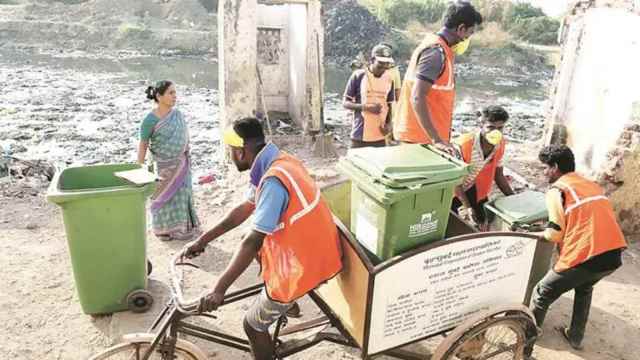
In March 2016, the Ministry of Environment, Forests, and Climate Change under the Government of India, formally introduced the Solid Waste Management (SWM) Rules. These regulations, for the first time, acknowledged the integration of “waste pickers” and other informal waste collectors by providing clear definitions and recognising their pivotal role in the waste recycling process. The rules also mandate the provision of occupational identification (ID) cards that acknowledge the right of informal waste pickers to access, collect and sell waste.
The official acknowledgment came to light following the long-overdue recognition that waste pickers significantly contribute to the city’s sanitation, environment, and economic aspects. They keep cities clean. They also contribute to mitigating climate change by diverting substantial amounts of recyclable materials away from landfills, reducing methane emissions and creating an overall positive environmental impact. Their proactive efforts in waste collection and management reduce the burden on municipal waste disposal systems. In the pandemic — 2020 and 2021 — waste pickers were seen by many research and academic reports as frontline workers.
The plight of waste pickers is exacerbated by various challenges in upholding their rights, including restrictive regulatory frameworks, social marginalisation, economic instability, and increased health and safety hazards. The glaring lack of attention to the inclusion of this particular occupation within governmental initiatives and schemes undermines the effectiveness of these programmes.
Why there is a need for Occupational ID cards
The implementation of occupational ID cards holds promise for revolutionising the lives and livelihoods of waste pickers. It creates an opportunity for formal recognition and dignity. These ID cards can serve as a tangible symbol of acknowledgment and validation of their essential role in waste management systems. The potential impact of these occupational ID cards extends far beyond mere identification. They would offer a gateway to various socio-economic benefits and rights that have long eluded waste pickers. By possessing these formal credentials, waste pickers gain visibility within formal structures and are better positioned to access basic services, including healthcare, education, pension and other social security benefits. Moreover, these cards facilitate the integration of waste pickers into formal waste management mechanisms, granting them the opportunity for fair wages, improved working conditions, spatial and socio-legal protection against exploitation.
In Delhi, there are estimated to be around 1,00,000 to 1,50,000 waste pickers, a substantial number of whom are women. However, a significant portion of these women often work with their family members and are not formally recognised or counted as workers. Currently, the absence of recognition and formalisation has put the waste pickers, especially women, in a precarious state within both society and the waste management ecosystem.
As informal workers, waste pickers are also vulnerable to eviction or displacement. Unlike municipal or private workers, they are not able to access the sorting centres which hampers their livelihood and earnings. The lack of formal recognition also diminishes their negotiation power that leaves them unable to secure fair compensation for the waste they collect and segregate, which subsequently leads to exploitation by middlemen or larger private waste management entities.
The inspiration for this initiative stemmed from the Kagad Kach Patra Kashtakari Panchayat (KKPKP) and Hasirudala with the support of whom the Pune Municipal Corporation (PMC) and Bruhat Bengaluru Mahanagara Palike (BBMP) respectively initiated the issuance of ID cards to waste pickers, a significant step in acknowledging their contributions. These ID cards provide access to a range of benefits, including social security, interest-free loans, safety equipment and waste infrastructure aiming to improve the socio-economic status of waste pickers and to promote decentralised waste management in the cities.
The Process
The process of issuing Occupational ID cards for waste pickers is simple and involves several key steps implemented by authorities. Initially, a comprehensive survey and enumeration must be conducted by relevant agencies to recognise these workers, their skills and contributions. Following the self-declaration by workers, occupational ID cards should be issued.
These ID cards not only formalise their role but also serve as a licence to work and gain social benefits. With these ID cards, waste pickers can gain easier access to RWAs, public spaces and waste sorting sites.
To ensure equitable decisions and effective implementation, a welfare committee or board, comprising waste pickers, NGOs, unions and governing authorities, should be established. This committee will collaborate to make inclusive decisions to ensure that the voices and needs of waste pickers are duly represented and addressed in policy formulations and program implementations. Furthermore, designated spaces for waste sorting and segregation at the local level should be allocated on the basis of enumeration, which would optimise their efficiency and enhance working conditions.
Entailment of Occupational ID cards
The authorised ID cards should contain essential details such as the waste pickers’ photograph, name, age, gender, occupation, address, ward number, and their specific role in waste management (e.g., waste collectors, segregators). Additionally, the date of issue should be included. A database shall be compiled to demonstrate the count of existing waste pickers in the city and the number who have been issued occupational ID cards. Showcasing composition regarding age, gender, grievances, etc., on the portal would be preferable for a comprehensive understanding of waste pickers’ demographics and their working conditions. This information can aid in tailored assistance, transparency, policy formulation and targeted support.
Advocating for change
Realising the implementation of occupational ID cards for waste pickers demands concrete effort from multiple stakeholders. Government support is crucial in formulating policies that explicitly recognise waste pickers, and in allocating resources for the issuance of ID cards. To maximise outreach, municipal authorities with the help of local NGOs and unions can organise awareness and registration camps.
The government, supported by policy reforms and community engagement, can expeditiously implement occupational ID cards for waste pickers. It is a collective responsibility to ensure the recognition and protection of this invaluable workforce and to acknowledge their role in economic, social and environmental sustainability while safeguarding their rights and dignity.
The writer is a core member of Delhi Roundtable of Solid Waste Management